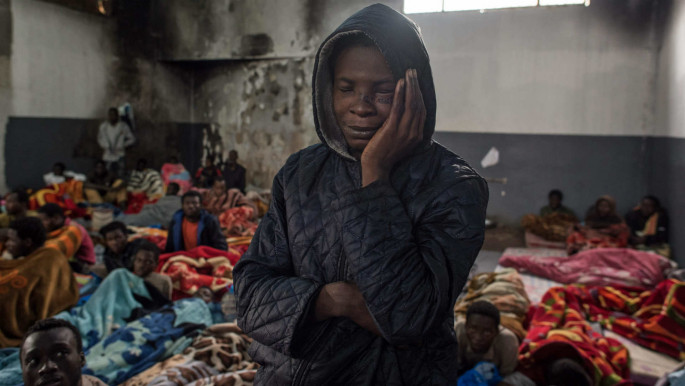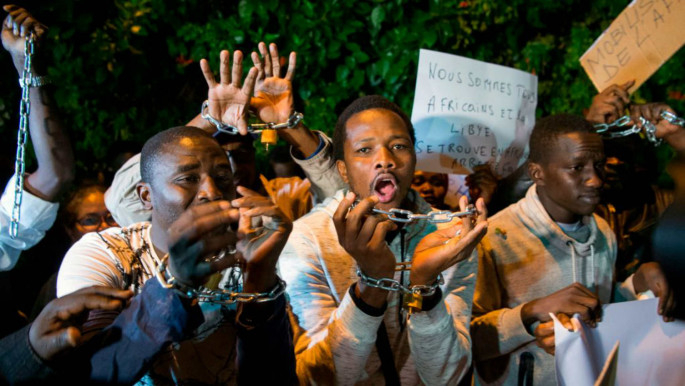
New EU reforms could see refugees deported to Libya's slave markets
But a proposed regulation changing the definition of a "safe third country", currently being kicked back and forth between the European Council, Commission and Parliament, could see asylum-seekers kicked out of Europe without their cases being heard. Instead, desperate asylum-seekers would be forced to file claims in North African countries whose abysmal human rights records replicate the conditions they have fled.
People might even be deported to countries only safe in "certain zones", raising the possibility of return to a lawless nation like Libya, should parts of the country controlled by the interim government be deemed "safe".
The proposal raises the spectre of "dirty deals with pretty nasty regimes," UNHCR's former head of policy development, Jeff Crisp, told The New Arab: "The notion of safe countries in North Africa and the Sahel is a new and very dangerous development."
"It's easy to agree on stopping slavery and detention conditions because that puts the blame back on Libya, without saying why people are ending up in detention in the first place: because they're intercepted by an EU-funded coastguard and sent back into danger."
 |
Poland, Slovakia and the Czech Republic have accepted 28 relocated refugees between them - out of a quota of over 11,000. |  |
'Safe' countries
Under the Dublin Regulations, refugees arriving in the EU should have their asylum case heard in their first country of arrival – though this has not always happened in practice. Germany has long refused to return migrants to Greece, for example, owing to the poor humanitarian conditions there.
But under the proposed revisions – a 2016 draft can be read here – refugees could be returned to a "safe third country" outside the EU which supposedly guarantees human rights, and forced to make an asylum claim there without a single case heard in an EU court.
This would mean asylum-seekers fleeing humanitarian crises could be summarily deported to North African nations such as Morocco, Algeria or Tunisia.
Twitter Post
|
All three countries are deemed safe by European policy-makers, though reports of torture, police brutality, arbitrary imprisonment and enforced disappearances are routine in these countries.
In the key transit nation, Morocco, to take one example, sub-Saharan African migrants commonly suffer police beatings, expulsion without due process, and endemic sexual abuse. The EU would no longer be required to carry out a personal assessment of a refugee's case to check whether their life or liberty would be in danger if they were sent to these "safe" countries. Merely crossing one of these countries would be seen as reason enough for someone to be returned there.
The presumption of safety
Paolo Biondi worked for the EU Commission on the first draft of the Directive, pushing to make it comply with human rights law.
"A person should never be returned to a country at risk and should have the right and the possibility to rebut the presumption of safety," he told The New Arab.
Yet this is precisely what would happen to ever-greater numbers of migrants if this binding EU regulation is enacted.
More worryingly still, a "safe third country" could be redefined to include the safer "zones" of that country, or declare a certain nation safe for certain ethnicities. Hence asylum-seekers might face deportation to Libya, or other refugee-trail countries such as Sudan with equally appalling human rights records, on the grounds that certain regions of these nations are "safe" for certain individuals.
Read more: EU pays Sudan blood-money to stop migrant routes
LGBTQ asylum-seekers might be returned to countries as full of state-sanctioned violence and oppression as those they fled. As we recently saw in Libya, the very governments people are running from might be invited in to refugee camps to pick out and coercively repatriate their own citizens.
 |
|
| A detainee at the Tariq Al-Matar detention in Libya [AFP] |
At the end of last month, the European Commission heard a raft of proposed changes to the Common Europe Asylum System. Some, such as the proposition to amend the failed refugee quota system to allow extra support for nations facing "challenging" or "crisis" circumstances, could in principle create a safer, fairer Europe for asylum-seekers and poorer European nations alike.
Others, such as the scrapping of visa-waived entry and asylum claims in airport transit zones, would choke off legal routes to asylum claims and condemn more refugees to the lethal Mediterranean crossing.
But these negotiations are mired in deadlock, and only the proposition of "flexible legal tools, based on enhanced cooperation with third countries" to allow swift expulsion from Europe is making much headway.
The Eastern bloc's influence
The idea of introducing migrant-processing offices in key transit countries such as Niger, Egypt, and Lebanon has long been floated by politicians eager to outsource the migrant crisis to other, poorer countries.
 |
Reports of torture, police brutality, arbitrary imprisonment and enforced disappearances are routine |  |
Similar actions have been tried elsewhere in Europe on a local basis: Norway classified Russia as a "safe third country" in 2016 to shut off migration flows, but he Estonian courts threw out a similar proposition due to a "substandard protection" of asylum seekers' rights in Russia.
But this proposal more closely follows the policy of hard-right Eastern European governments like Viktor Orbán's in Hungary. Among nine EU nations which have failed to settle a single refugee under the relocation programme, Hungary insists that Serbia is a "safe third country" and refuses applications from anyone passing through their non-EU Eastern neighbours. That refugees in Serbia are forced to linger in "makeshift camps in appalling conditions", facing "infections and serious diseases" as well as police violence along the border, is of no concern to Orbán.
Fines from the European Court of Justice notwithstanding, attempts to introduce pan-European relocation of refugees have repeatedly been blocked by Hungary and the other Visegrad group nations of Poland, Slovakia and the Czech Republic – who have accepted a miserly 28 relocated refugees between them out of a quota of over 11,000.
Hungary's authoritarian leader has clearly stated his position that "asylum procedures should be completed outside the EU in closed and protected hotspots before the first entry on the territory of the EU", and Brussels now appears to be dancing to his tune.
Read more: Hungary's 'show' trials: Refugees not welcome here
Paolo Biondi says: "It is… up to the border countries [such as Italy or Spain] to make their voice heard in the [European] Council," but at the moment these voices are meekly murmuring assent to hard-right elements in the Eastern Bloc, as they push for policies which replicate the so-called EU-Turkey deal
Under this arrangement, refugees are deported from Greece to face the brutal, opaque Turkish asylum system from inside a jail cell - with practically no chance of securing protection.
 |
|
| Activists protest against slavery autions in Libya [CMS] |
"The whole thrust of European policy is about return," said Jeff Crisp.
"The bottom line is money [in return for] stopping people leaving Turkey and entering Greece."
As in Turkey, he warns, returning refugees wholesale to North Africa means returning them to countries where human rights guarantees are impossible for UNHCR to secure.
"There's a vested interest on the EU's part to insinuate these regimes are not as bad as they seem to be," he says.
Washing our hands
These hard-right governments have left any efforts to develop an effective relocation mechanism or reform the Dublin Regulations in deadlock.
By removing the requirement that refugees have any tie to the "third country" they cross, by scrapping individualised assessments of whether asylum-seekers will be at risk in these countries and by handing over "considerable and morally questionable financial and political compensation" to regimes complicit in human rights abuses, the EU would endanger the lives of vulnerable refugees.
Rather than tear up the inhumane EU-Turkey deal, European policymakers are treating it as a blueprint to treat with nations with even worse human rights records. Rather than cutting off our funding and support for the butchers of the Libyan coastguard, they are contemplating full-scale collaboration with so-called "safe countries" which are anything but.
"How can you say: 'we've done what we can and now it's up to Africa to sort it out'?" asks Jeff Crisp. "The chaos which ensued from the EU's role in military intervention in Libya is something we can't wash our hands of."
But anything, it seems, is preferable to opening up safe and legal migration routes so that refugees can have their asylum claims heard in truly safe countries without risking persecution or death.
Matt Broomfield is a freelance journalist who has written for the Independent, VICE and Motherboard.
You can follow him on Twitter - @Hashtagbroom.
Opinions expressed in this article remain those of the author and do not necessarily represent those of The New Arab, its editorial board or staff.





 Follow the Middle East's top stories in English at The New Arab on Google News
Follow the Middle East's top stories in English at The New Arab on Google News


